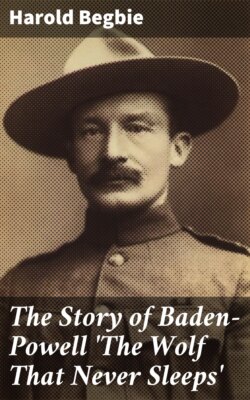Читать книгу The Story of Baden-Powell 'The Wolf That Never Sleeps' - Harold Begbie - Страница 11
На сайте Литреса книга снята с продажи.
CARTHUSIAN
ОглавлениеTable of Contents
A gentleman once wrote to the late headmaster of Charterhouse, Dr. William Haig-Brown, saying that he wished to have his son "interred" at that school. The headmaster wrote back immediately saying he would be glad to "undertake" the boy. The same headmaster being shown over a model farm remarked of the ornamental piggery, built after the manner of a Chinese Pagoda, that if there was Pagoda outside there was certainly pig odour inside.
Such a man as this is sure to have been impressed by the personality of Master Ste, who, in 1870, came to him in the old Charterhouse, that hoary, venerable pile which seems to shrink into itself, as if to shut out the unpoetic and modern atmosphere of Smithfield Meat Market. B.-P. went to Charterhouse as a gown boy, nominated by the Duke of Marlborough, and owing to the ease with which his infant studies had been conducted, was obliged to enter by a low form. But he had, as we have already said, an enquiring mind. He had also a clear brain, all the better for not having been crammed in childhood; and, therefore, strong in body, full of health and good spirits, and just as keen to get knowledge as to get a rare bird's egg, he began his school-days with everything in his favour. The result was that 1874 found him in the sixth, and one of the brilliant boys of his time.
Dr. Haig-Brown, as we have said, was sure to have been impressed by B.-P., and there is no need for his assurance that he remembers the boy perfectly. Of course, when one sits in his medieval study and asks the Doctor to discourse of B.-P., he begins by recalling Ste's love of fun; indeed, it is with no great willingness that he leaves that view of his pupil. But the boy's inflexibility of purpose, his uprightness and his eagerness to learn are as equally impressed upon the headmaster's mind, and he likes to talk about the exhilarating effect which B.-P.'s virile character had upon the moral tone of the school. "I never doubted his word," Dr. Haig-Brown told me, and by the tone of the headmaster's voice one realised that B.-P. was just one of those boys whose word it is impossible to doubt. A clean, self-respecting boy.
He was the life of the school in those entertainments for which Charterhouse has always been famous, and his reputation as a wit followed him from the stage into the playground. B.-P. was a keen footballer, and whenever he kept goal there was always a knot of grinning boys round the posts listening with huge delight to their hero's facetiæ. He also had the habit, such were his animal spirits, of giving the most nerve-fluttering war-whoop imaginable when rushing the ball forward, and this cry is said to have been of so terrifying a nature as to fling the opposing side into a state of fear not very far removed from absolute panic. By the way, it is interesting in the light of after-events to read in the school's Football Annual (1876, p. 30) that "R.S.S. B.-P. is a good goalkeeper, keeping cool, and always to be depended upon."
But it was not only at football that Baden-Powell spent his time in the playground, although it was only in football that he shone. Into every game he threw himself with zest and earnestness, playing hard for his side, and finding himself always regarded by his opponents as an enemy to be treated with respect. That he continued to play cricket, racquets, and fives, although not a great success, is characteristic of his devotion to sports, and his habit of doing what is the right thing to do. Then he was a faithful and lively contributor to the school magazine, added his lusty young voice to the chapel choir, and was for ever seeking out excuses for getting up theatricals. Of one of his performances at the end of the Long Quarter in 1872 it is interesting to note that the Era of that time remarked that it was "full of vivacity and mischief." He was always a great success as an old woman, and we shall see that in later days he played a woman's part with huge success in far Afghanistan. At one of these school entertainments big brother Warington was present, and he laughingly recalls how the vast audience of shiny-faced boys broke into a great roar of delight directly B.-P. appeared in the wings—before he had uttered a word or made a grimace. Dr. Haig-Brown and the other masters who remember B.-P. like to recall scenes of this kind, and it is no disparagement of Ste's other sterling qualities that they seem to have been more impressed by his excellent fooling than by any other of his good qualities. It is the greater tribute to his genius for acting.
